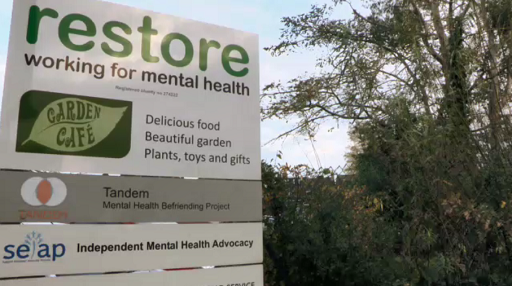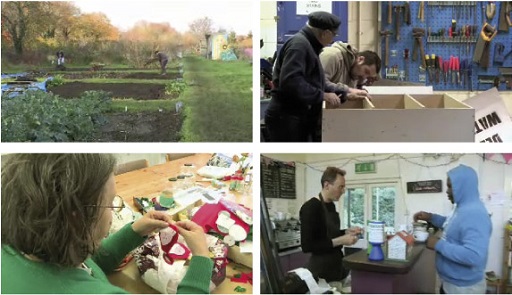3 Employment and recovery
The connection between employment and mental wellbeing means that even if work were a significant factor in the development of mental health problems, the mental health recovery process often involves work of some kind. Nick and Louis’ return to employment at Restore starts with a ‘recovery group’ in which they can work at carpentry, gardening, crafts or in a café. These groups offer Nick and Louis a work-like environment where they follow the structure of a regular working day. This work matters commercially too – their services and products are for sale to the local community.
Recovery groups are successful because they follow ‘recovery principles’ (see below). How might these be enacted in practice to meet Nick and Louis’ needs?
The principles of recovery
- Recovery is about building a meaningful and satisfying life, as defined by the person themselves, whether or not there are ongoing or recurring symptoms or problems.
- Recovery represents a movement away from pathology, illness and symptoms to health, strengths and wellness.
- Hope is central to recovery and can be enhanced by each person seeing how they can have more active control over their lives (‘agency’) and by seeing how others have found a way forward.
- Self-management is encouraged and facilitated. The processes of self-management are similar, but what works may be very different for each individual. No ‘one size fits all’.
- The helping relationship between clinicians and patients moves away from being expert/patient to being ‘coaches’ or ‘partners’ on a journey of discovery. Clinicians are there to be ‘on tap, not on top’.
- People do not recover in isolation. Recovery is closely associated with social inclusion and being able to take on meaningful and satisfying social roles within local communities, rather than in segregated services.
- Recovery is about discovering – or re-discovering – a sense of personal identity, separate from illness or disability.
- The language used and the stories and meanings that are constructed have great significance as mediators of the recovery process. These shared meanings either support a sense of hope and possibility, or invite pessimism and chronicity.
- The development of recovery-based services emphasises the personal qualities of staff as much as their formal qualifications. It seeks to cultivate their capacity for hope, creativity, care, compassion, realism and resilience.
- Family and other supporters are often crucial to recovery and they should be included as partners wherever possible. However, peer support is central for many people in their recovery.
Activity 3 Recovery groups for employment
There are two tasks in this activity. You’ll start by thinking through how you could put recovery principles into action to meet Nick and Louis’ needs before looking at a real-life example of a recovery group.
Part A
Working from the recovery principles listed above, identify at least three recommendations for an effective recovery group. Make sure that these recommendations are suitable for Nick and Louis’ needs. Here is an example to get you thinking:
- Recruit caring and optimistic staff who value working in partnership with those attending the recovery group.
Part B
In the video below Nick and Louis describe their experience of a recovery work group.
- Which experiences reflect your suggestions and guidelines?
- Do they mention any features that were not on your list but which you think were effective?

Transcript: Video 2 Recovery group at Restore
Comment
The video depicts several things in line with recovery principles. Your recommendations will be your own, but here are four that you may have spotted in the video.
Recommendation 1: Group activities should help people access peer support.
At Restore, group activities provided plenty of opportunities to receive empathic support from others. Louis valued the way the family atmosphere built confidence.
Recommendation 2: Individuals should be able to choose what best suits their needs and interests.
At Restore, the day started with a meeting in which people chose an activity from tasks that needed doing. Louis valued being able to do tasks he ‘felt up to doing’.
Recommendation 3: Group activities should support community inclusion.
Restore’s café was open to the public. Louis may not want to return to catering but Nick might value the café as a place to perform music.
Recommendation 4: Make sure that participants find the activities meaningful.
Nick felt a strong (and almost spiritual) sense of personal connection to gardening work.
The recovery groups are one step toward returning to paid employment. For many people though, their ultimate aim is a return to paid employment. What support is necessary to enable people to find and keep work?

